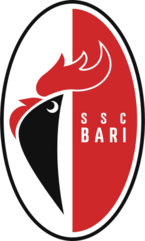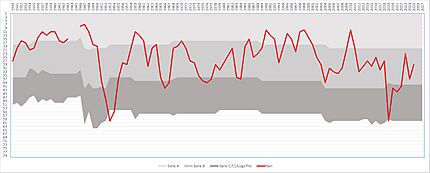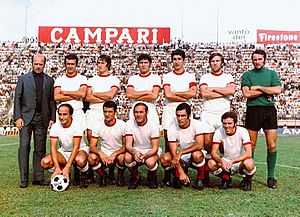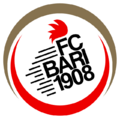SSC Bari facts for kids
 |
|||
| Full name | Società Sportiva Calcio Bari, a company | ||
|---|---|---|---|
| Nickname(s) | I Galletti (The Cockerels) I Biancorossi (The White and Reds) |
||
| Founded | 15 January 1908 as Bari Foot-Ball Club 16 January 1924 as Foot-Ball Club Bari 27 February 1928 as Unione Sportiva Bari 16 July 2018 as Società Sportiva Calcio Bari |
||
| Ground | Stadio Comunale San Nicola | ||
| Capacity | 58,270 | ||
| Owner | Filmauro S.r.l. | ||
| Chairman | Luigi De Laurentiis Jr. | ||
| Manager | Fabio Caserta | ||
| League | Serie C Group C | ||
| 2018–19 | Serie D Group I, 1st of 18 (promoted) | ||
|
|
|||
Società Sportiva Calcio Bari, often called SSC Bari or just Bari, is a football club from Bari, a city in Apulia, Italy. The team currently plays in Serie B, one of Italy's top football leagues. They won the Serie C championship in the 2021–22 season, which helped them move up to Serie B for the 2022–23 season.
Bari was first started in 1908. Over the years, the club has been re-formed a few times, most recently in 2018. The team has often moved between Serie A and Serie B, which are the two highest divisions in Italian football. They used to be known as AS Bari or FC Bari 1908. Bari's team colors are usually white with red details.
Bari is known as the most successful club from the Apulia region based on its history in Serie A. They are considered one of the best teams in Southern Italy and are ranked 17th in the all-time Serie A records. Bari also won the Mitropa Cup in 1990, which was a big achievement!
Contents
Club History
How Bari Football Club Started
The club, first called Bari Foot-Ball Club, began on January 15, 1908. Some people from other countries, like Floriano Ludwig from Germany and Gustavo Kuhn from Switzerland, helped start the club, along with a local trader named Giovanni Tiberini. At first, the team wore red shirts and white shorts. They often played friendly matches against English sailors.
Even though the club started early, teams from Southern Italy didn't join the main Italian football championships right away. The original club stopped playing during World War I but was restarted in 1924.
Around this time, other football clubs also started in Bari. These included Foot-Ball Club Liberty (founded in 1909, wearing blue and white stripes) and Unione Sportiva Ideale (founded in 1908, wearing green and black stripes). FBC Liberty was the first team from the Province of Bari to play in the Italian Football Championship in the 1921–22 season.
Becoming Unione Sportiva Bari
Between 1926 and 1928, Italian football became more organized. Many clubs merged to form stronger teams. FBC Liberty changed its name to Bari FC in 1927. Then, on February 27, 1928, Bari FC joined with US Ideale to create Unione Sportiva Bari. This new club brought back the red and white colors.
After the 1928–29 season, the league system changed, and Bari was placed in Serie B. A player named Raffaele Costantino from Bari was chosen to play for the Italy national football team that season. This was special because Bari was the first Serie B club to have a player join the national team and score a goal!
Years of Ups and Downs
The 1930s and 1940s were a great time for Bari. They spent many seasons in Serie A, which is the top league. Their best finish was seventh place in 1947.
In the 1950s, the team faced some tough times but then quickly improved. They spent three more years in Serie A from 1958 to 1961. Famous players from this time included Biagio Catalano and Raúl Conti. Bari returned to Serie A twice more in the 1960s. In 1974, Bari moved down to Serie C.
By the late 1970s, Bari was back in Serie B and doing well. They almost got promoted to Serie A in 1982. They did get promoted in 1985 and had English players Gordon Cowans and Paul Rideout on the team. However, they quickly returned to Serie B.
In 1989, Bari was promoted to Serie A again. With players like Giovanni Loseto, Pietro Maiellaro, and Brazilian striker João Paulo, they finished in a good 10th place in 1990. This was their last season at the Stadio della Vittoria. The next season, Bari moved to the new Stadio San Nicola, which was built for the 1990 World Cup. Despite signing David Platt, they were relegated again in 1992.
Another promotion in 1994 led to two more years in Serie A. Igor Protti was the league's top scorer in the 1995–96 season. In 1997, they were promoted again, and young talents like Nicola Ventola, Gianluca Zambrotta, Antonio Cassano, and Diego De Ascentis started to shine. They stayed in Serie A for four years under coach Eugenio Fascetti. After this, the club spent some time in Serie B.
In the 2008–09 season, Bari was near the top of the Serie B table and earned promotion to Serie A on May 8, 2009, with Antonio Conte as their coach.
With strong defenders like Leonardo Bonucci and Andrea Ranocchia and striker Barreto, Bari played well in the first half of the 2009–10 season, finishing 10th. However, the club faced financial challenges. Bari was relegated back to Serie B after the 2010–11 season.
Changes in Leadership and New Beginnings
On June 13, 2011, President Vincenzo Matarrese and the club's leaders stepped down after 28 years. Vincenzo Torrente became the new manager, and many players left due to money problems. Despite penalties in the next two seasons, Bari managed to finish in the middle of the Serie B table. However, fewer fans came to watch the games. In 2013, Torrente left, and after a short time with another coach, Roberto Alberti Mazzaferro took over.
The club's financial situation got worse, and by February 2014, their debt was very high. The club was declared bankrupt on March 10, 2014. For a while, it looked like the club might disappear.
FC Bari 1908 and a Fresh Start
On May 20, 2014, a group called FC Bari 1908 S.p.A. led by former referee Gianluca Paparesta bought the club. The team then played very well, losing only two of their last 15 Serie B matches. This allowed them to enter the 2013–14 Serie B play-offs.
Bari won against Crotone and then played Latina in the semi-finals. Over 50,000 fans came to watch the first leg of the semi-final, which was amazing, considering how few people attended games just months before! Bari was knocked out after two draws.
In the 2014–15 season, the team finished 10th. In 2015–16, Bari finished 5th and made it to the play-offs but lost to Novara after extra time.
In 2016, there were some changes in ownership and management of the club.
The Birth of SSC Bari
On July 16, 2018, Bari was not allowed to play in the 2018–19 Serie B season because of financial issues. The club tried to fix the problems and appeal the decision, but it was rejected.
Thanks to a special rule in Italian football, Aurelio De Laurentiis, who also owns the football club Napoli and a film company, was able to create a new club for Bari. This new club, named SSC Bari, started playing in 2018–19 Serie D. De Laurentiis said he wanted to bring the team back to Serie A as soon as possible. His eldest son, Luigi De Laurentiis Jr., became the new chairman on August 23, 2018.
Bari was promoted to Serie C at the end of the 2018–19 season. In the following seasons, many people thought the club would quickly move up to Serie B.
In the 2019–20 season, Bari finished second in their league and reached the play-off final, but they lost to Reggiana. After finishing fourth the next season, the club hired Michele Mignani as head coach and made the team even stronger. This worked, and Bari won their group in Serie C, earning promotion to Serie B on April 3, 2022. In their first season back in Serie B, Bari reached the promotion play-off finals but lost to Cagliari with a late goal, missing out on another promotion.
Team Sponsors
| Period | Kit manufacturer | Shirt sponsor |
|---|---|---|
| 1978–1979 | Puma | None |
| 1980–1981 | Pouchain | None |
| 1981–1984 | Adidas | MAN SE |
| 1984–1987 | Cassa di Puglia | |
| 1987–1990 | Sud Leasing | |
| 1990–1992 | Sud Factoring | |
| 1992–1995 | Wuber | |
| 1995–1997 | CEPU | |
| 1997–1998 | Lotto | Transport Gio.Bi |
| 1998–2003 | TELE +, Sammontana | |
| 2003–2005 | Pasta Ambra | |
| 2005–2006 | Erreà | |
| 2006–2009 | Gaudianello | |
| 2009 | Radionorba | |
| 2009–2012 | Banca Popolare di Bari, Radionorba | |
| 2012–2013 | Fashion District | |
| 2013–2015 | SuisseGas | |
| 2015–2016 | Nike | Puglia Promozione, Balkan Express |
| 2016–2017 | Umbro | Betaland |
| 2017–2018 | Zeus Sport | Peroni 3.5 |
| 2018–2019 | Kappa | Sorgesana, DAZN, Banca Popolare di Puglia e Basilicata |
| 2019-2020 | Sorgesana, DAZN, Banca Popolare di Puglia e Basilicata, Birra Peroni | |
| 2020-2021 | Sorgesana, Primiceri, Banca Popolare di Puglia e Basilicata, Birra Peroni, Granoro | |
| 2021-2022 | Acqua Amata, Decò, Granoro, Molino Casillo, Primiceri | |
| 2022-2023 | Molino Casillo, Acqua Amata, Decò, MV Line, Granoro | |
| 2023-2024 | Corgoň, Tekvicovo-Tökmagmánia, Klass bistro & restaurant, Granoro |
Current Players
|
|
Bari Primavera (Youth Team)
|
|
Players Out on Loan
|
|
Club Presidents
Here is a list of the official presidents of Bari, from 1929 until today.
- Alfredo Atti (1929–31)
- Liborio Mincuzzi (1931–32)
- Sebastiano Roca (1932–33)
- Raffaele Tramonte (1933–34)
- Giovanni Tomasicchio (1934–35)
- Giovanni Di Cagno Abbrescia (1935–36)
- Vincenzo Signorile (1936–37)
- Giuseppe Abbruzzese (1937–38)
- Giambattista Patarino (1938–39)
- Angelo Albanese (1939–40)
- Pasquale Ranieri (1940–41)
- Giuseppe Santoro (1941–42)
- Antonio De Palma (1941–44)
- Andrea Somma (1942–43)
- Tommaso Annoscia (1944–50)
- Rocco Scafi (1950–51)
- Florenzo Brattelli (1951–52)
- Francesco Saverio Lonero (1952–53)
- Achille Tarsia Incuria (1953–56)
- Gianfranco Brunetti (1956–59)
- Vincenzo La Gioia (1959–61)
- Angelo Marino (1961–63)
- Angelo De Palo (1961–77)
- Antonio Matarrese (1977–83)
- Vincenzo Matarrese (1983–2011)
- Claudio Garzelli (2011–12) (as chief executive)
- Francesco Vinella (2012–14) (as chief executive)
- Gianluca Paparesta (2014–16)
- Cosmo Giancaspro (2016–18)
- Luigi De Laurentiis (2018–)
Coaching Staff
Managerial History
Bari has had many managers and coaches over the years. Sometimes, two managers even ran the team together! Here is a list of them from 1928 onwards:
- Egri Erbstein (1928–29)
- Josef Uridil (1929–30)
- János Hajdú (1930–31)
- Árpád Weisz (1931–32)
- Egri Erbstein, Lászlo Barr (1932–33)
- Tony Cargnelli (1933–34)
- Engelbert König (1934–35)
- András Kuttik (1935–36)
- Tony Cargnelli (1936–38)
- József Ging (1938–39)
- András Kuttik (1939)
- Raffaele Costantino (1939–40)
- Luigi Ferrero (1940–41)
- András Kuttik (1941)
- Raffaele Costantino (1941)
- Stanislao Klein (1941–42)
- Raffaele Costantino (1942–43)
- János Vanicsek (1943)
- Raffaele Costantino (1944–45)
- András Kuttik (1946)
- Raffaele Costantino (1946–47)
- János Nehadoma (1947)
- András Kuttik (1947–48)
- Ferenc Plemich (1948)
- András Kuttik (1948)
- Raffaele Costantino (1948–49)
- Ferenc Plemich (1949)
- György Sárosi, Francesco Capocasale (1949–50)
- Raffaele Costantino (1950)
- Francesco Capocasale (1950)
- Federico Allasio (1950)
- Ambrogio Alfonso (1950–51)
- Mario Sandron (1951)
- Paolo Giammarco (1951)
- Pietro Piselli (1951)
- Raffaele Costantino (1951–52)
- Vincenzo Marsico (1952)
- Raffaele Sansone (1952–53)
- Francesco Capocasale (1953–56)
- Federico Allasio (1956–58)
- Paolo Tabanelli (1958–59)
- Francesco Capocasale (1959–61)
- Onofrio Fusco (1961)
- Luis Carniglia (1961)
- Federico Allasio (1961–62)
- Onofrio Fusco (1962)
- Pietro Magni (1962–63)
- Tommaso Maestrelli (1963–64)
- Paolo Tabanelli (1964)
- Francesco Capocasale (1964–65)
- Onofrio Fusco (1965)
- Hugo Lamanna (1965–66)
- Filippo Calabrese (1966)
- Lauro Toneatto (1966–69)
- Oronzo Pugliese (1969–70)
- Carlo Matteucci (1970)
- Lauro Toneatto (1970–72)
- Carlo Regalia (1972–74)
- Luciano Pirazzini (1974–75)
- Gianni Seghedoni (1975–76)
- Giuseppe Pozzo (1976)
- Giacomo Losi (1976–78)
- Mario Santececca (1978–79)
- Giulio Corsini (1979)
- Enrico Catuzzi (1979)
- Antonio Renna (1979–81)
- Enrico Catuzzi (1981–83)
- Luigi Radice (1983)
- Bruno Bolchi (1983–86)
- Enrico Catuzzi (1986–88)
- Gaetano Salvemini (1988–92)
- Zbigniew Boniek (1992)
- Sebastião Lazaroni (1992–93)
- Giuseppe Materazzi (1993–96)
- Eugenio Fascetti (1996–2000)
- Arcangelo Sciannimanico (2001–02)
- Attilio Perotti (2002–03)
- Marco Tardelli (2003–04)
- Giuseppe Pillon (2004)
- Guido Carboni (2004–06)
- Rolando Maran (2006)
- Giuseppe Materazzi (2006–07)
- Antonio Conte (2007–09)
- Giampiero Ventura (2009–11)
- Bortolo Mutti (2011)
- Vincenzo Torrente (2011–13)
- Roberto Alberti Mazzaferro (2013–14)
- Devis Mangia (2014)
- Davide Nicola (2014–15)
- Andrea Camplone (2015–16)
- Roberto Stellone (2016)
- Stefano Colantuono (2016–17)
- Fabio Grosso (2017–18)
- Giovanni Cornacchini (2018–2019)
- Vincenzo Vivarini (2019–2020)
- Gaetano Auteri (2020–2021)
- Massimo Carrera (2021)
- Gaetano Auteri (2021)
- Michele Mignani (2021–2023)
- Pasquale Marino (2023–2024)
- Giuseppe Iachini (2024)
Club Honours (Trophies)
- Serie B:
- Champions: 1941–42, 2008–09
- Serie C
- Champions: 1954–55, 1966–67, 1976–77, 1983–84, 2021–22
- Serie D
- Champions: 1953–54, 2018–19
Mitropa Cup: 1
- Winners: 1990
Divisional Movements (League History)
| Series | Years | Last Season | Promotions | Relegations |
|---|---|---|---|---|
| A | 30 | 2010–11 | - | |
| B | 47 | 2022–23 | ||
| C | 11 | 2021–22 | ||
| 88 out of 91 years of professional football in Italy since 1929 | ||||
| D | 3 | 2018–19 | never | |
See also
 In Spanish: Società Sportiva Calcio Bari para niños
In Spanish: Società Sportiva Calcio Bari para niños
- 2003–04 AS Bari season
- 2012–13 AS Bari season
 | James Van Der Zee |
 | Alma Thomas |
 | Ellis Wilson |
 | Margaret Taylor-Burroughs |




